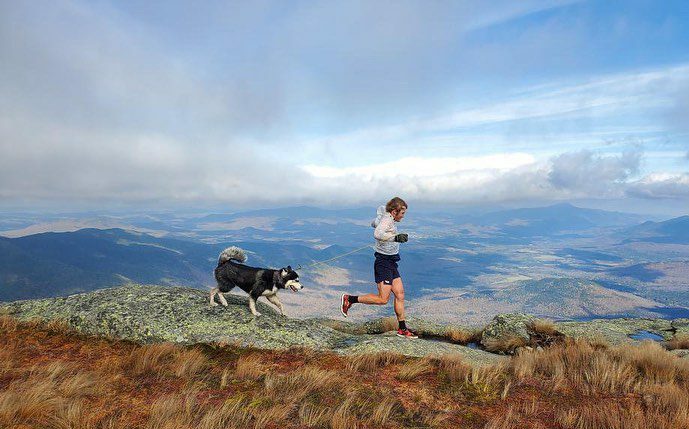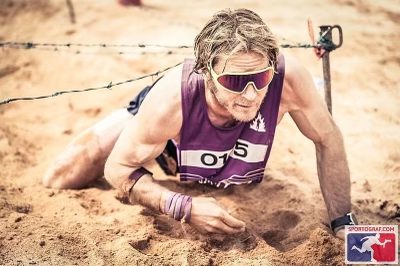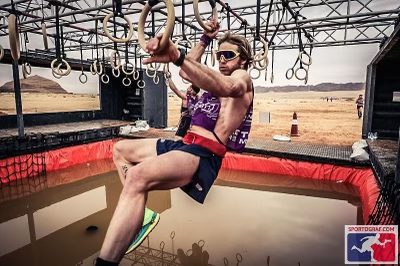Canadian ultrarunner claims $32,000 USD at Tough Mudder race in Saudi Arabia
Ontario's Ryan Atkins, who was fifth at last year's Bandera 100K ultra, took a close second at the Tough Mudder event behind fellow trail running champ, the U.K.'s Jonathan Albon
 Photo by:
Ryan Atkins
Photo by:
Ryan Atkins
Canadian ultrarunner Ryan Atkins took home a remarkable $32,000 prize for taking second place at the first-ever Tough Mudder Infinity AlUla (obstacle course race) event in AlUla, Saudi Arabia, held on Feb. 24. The event made waves with an astounding total prize purse of $480,000 USD, with multiple trail runners claiming top spots. Atkins, who has been a standout obstacle course racer for more than a decade, has cited his ability to run long distances, combined with strength, as aiding him in his podium OCR finishes—he was an ultrarunner and trail racer before he added OCR competitions to his impressive athletic resume.
While OCRs generally feature much higher prize purses than trail or ultrarunning events (where races usually offer minimal, if any, financial incentives), the Saudi Arabia event was still a high-paying exception to the norm. “The prize money at this event was crazy,” Atkins told Canadian Running. “Walking away with over $40, 000 CAD is a nice way to start the year.”

Obstacle course racing basics
Imagine combining the thrill of trail running with a series of challenging physical obstacles, and you have obstacle course racing (OCR). Courses may be set by distance or time, and feature obstacles like rope climbs, mud pits, wall climbs and monkey bars, to test not only your running stamina combined with strength, agility, and problem-solving skills. The Tough Mudder Infinity AlUla event brought athletes from 40 different nations together on a demanding 10K course that featured 20 obstacles per lap—competitors had to complete as many circuits as possible within an eight-hour timeframe.
Atkins’s endurance-based background
Atkins, who grew up in Ottawa, has a wide background in high-level sports that includes being a world unicycle champion as well as a World Cup mountain bike racer. He caught the ultradistance bug when a friend invited him on an 80K trail jaunt while on a trip to Killarney, Ireland. “It was my introduction to ultra running and it totally kicked my ass,” Atkins later told Impact Magazine. “I loved the challenge and it immersed me into running at a time when OCR started becoming more prevalent,” he says.
Atkins touts running as helping project him to stardom as a champion obstacle course racer; he has won the World’s Toughest Mudder numerous times (a 24-hour obstacle course race that includes 160K of mountain running) and has also been crowned OCR World Champion. Ultrarunning has seen Atkins take more than a few podiums, and in 2023 he claimed sixth place at the notoriously competitive Canyons Endurance Run by UTMB in California, and fifth in the equally deep field of the Bandera 100K held in Bandera, Texas.
Training difference between OCR and ultras
Atkins shared his training regime with Canadian Running. “Training for an ultra OCR usually involves mixing in strength elements into my running,” he says. “I did a workout that went like this: Run 10 mins tempo (3:30/km pace for me), perform 10 pull-ups, recover for 1 min, repeat 8x.”
Atkins explains that this session mixes the demands of the obstacles with running. “If I were just training for an ultra, I’d do less upper body strength and core work,” he says.

A close second-place finish for Atkins
In the men’s competition at the Tough Mudder Infinity AlUla, the spotlight was on Atkins and his long-time OCR rival, the U.K.’s Jonathan Albon, who is also an accomplished sky runner and claimed gold at the Skyrunning World Championships in 2018. Albon’s win saw him conquering 100 kilometers and securing the top prize of $80,000. Hot on his heels, Atkins covered the same distance, pocketing $32,000 USD for his performance.
Moving forward, Atkins says he would like to see more carryover between ultra-trail racing and OCR. “It seems ultra and trail doesn’t have much in the way of prize money, but the sponsorship money is way higher. There seems to be a disconnect between the two worlds and a lot of brands actively discourage their trail running athletes from competing in OCR,” he told Canadian Running. “I’d love to see more crossover and brands that support both athletes going forward!”


